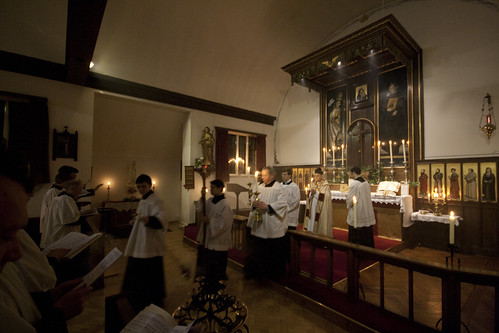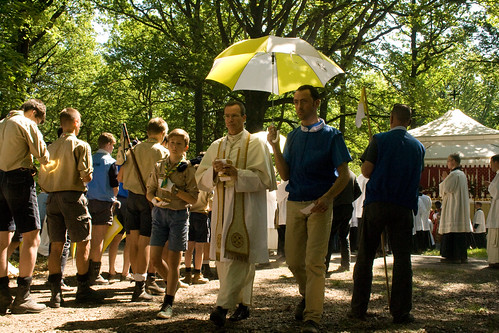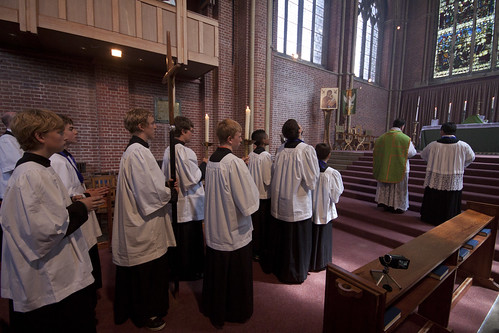
Servers processing out with the celebrant, Fr John Saward, at SS Gregory & Augustine in Oxford, past the liturgical schola.
The theological problem with girl servers is related to the impossibility of female ordination. In a nutshell, if women can't be ordained, it is innappropriate for them to assist at the altar in the quasi-clerical role of servers. If there are good reasons, as opposed to mere historical contingency, why women can't be ordained, then it would be natural for these reasons to count against female service at the altar.

It is always pointed out in the discussion of female ordination
 that Christ chose only men to be apostles and, therefore, as priests. Bl Pope John Paul II makes the point with great emphasis that this was a 'sovereign decision', not the result of social convention. To suggest that in a decision like this Our Lord was the slave of social convention is historically absurd (look at his other actions and words), and if true would undermine the whole gospel: if we can reject this decision on these grounds, then what would be left? Nevertheless, it is natural to ask why Our Lord made this decision, and John Paul answers by giving us a theological disourse on the nature and role of the feminine in the economy of salvation. He does this is Mulieris Dignitatem (On the Dignity of Women, 1988), and refers back to this in Ordinatio Sacerdotalis (1994) when he makes explicit the constant (and for that reason infallible) teaching of the Church that the Church does not have the power to ordain women. In short, it is because men and women have different characters and different roles in salvation history and the Church, as ordained by God, that God has established the reality that Holy Orders cannot be given to women.
that Christ chose only men to be apostles and, therefore, as priests. Bl Pope John Paul II makes the point with great emphasis that this was a 'sovereign decision', not the result of social convention. To suggest that in a decision like this Our Lord was the slave of social convention is historically absurd (look at his other actions and words), and if true would undermine the whole gospel: if we can reject this decision on these grounds, then what would be left? Nevertheless, it is natural to ask why Our Lord made this decision, and John Paul answers by giving us a theological disourse on the nature and role of the feminine in the economy of salvation. He does this is Mulieris Dignitatem (On the Dignity of Women, 1988), and refers back to this in Ordinatio Sacerdotalis (1994) when he makes explicit the constant (and for that reason infallible) teaching of the Church that the Church does not have the power to ordain women. In short, it is because men and women have different characters and different roles in salvation history and the Church, as ordained by God, that God has established the reality that Holy Orders cannot be given to women.At the bottom of it there is a connection between Christ's role as Priest and Victim and his masculinity. It would in fact be odd if there were not, since the priestly role, and the sacrifice of self for the community, is conformable with with the male role in human society, which I discussed in the last post. The priest as alter Christus must be a man because he is taking on this role himself. The clergy round the altar, and the altar servers, are also participating in this role, and it for that reason fitting that they be men also.

Boy scouts queing up to assist with the distribution of communion at the Chatres Pilgrimage 2010.
It really does not take a long chain of reasoning to see the application of the teaching about the all-male priesthood to girl servers. It is not possible to ordain women because it is not appropriate to their nature: saying Mass it is not part of their role in the Church. If it is totally impossible for women to say Mass, it is not appropriate for women and girls to assist the priest in the role of server. The server plays the part of a cleric: the laity serve when a cleric is not available. It is a quasi-clerical role, and it is not right that women play a clerical role.
Theology is not mathematics: theological argument does not advance by deductive syllogisms. What we have here is a case of something being, as the Scholastics constantly said, 'inconveniens': inconvient, inappropriate, unfitting. It is simply unfitting for girls to serve, because it runs contrary to the female role. In the same way it would have been unfitting for Our Lord to have been born of a woman not a virgin, for Our Lady's body to have been left in the tomb, and so on. To say that it runs against the symbolic and indeed ontological grain of the economy of salvation and the roles assigned to the sexes by the Creator is enough. It should not be done.

Servers about to process out at Mass at the St Catherine's Trust Summer School 2010.
But don't take my word for it; listen to this brilliant talk by Fr Brian Harrison (MP3), which he gave in the wake of the decision to allow female servers in 1992. His practical points at the end have been overtaken by events, but his theological analysis is acute. As he points out, it is perfectly clear that there is a connection between the desire to have altar girls and the desire to have women priests, nor are the most serious proponents of altar girls blind to this connection. If girls can have the quasi-clerical role of altar servers, this serves to undermine the teaching of the Church that women cannot be ordained.
Bl John Paul II's teaching on the different roles of men and women in the economy of salvation is equally true when Mass is said according to the Ordinary Form or the Extraordinary Form. The significance of this issue for the EF specifically is that the EF is the 'Traditional Mass': the Mass said, as Summorum Pontificum describes it, according to the Church's 'former liturgical traditions'. This is the Mass in which we adhere to the traditions which were current for the whole Church until a very short time ago. These are good traditions, and it is good for the Church that they be preserved. If they are lost in some contexts, it is especially good that they be preserved in others. The very document allowing girls to serve described male altar service as a 'noble tradition', and it is precisely for the preservation of traditions such as these that the 1962 Missal has been presevered - and preserved in its integrity.
<p>Pt 1:
ReplyDelete</p><p>
</p><p>A good and solid series, this. Timely, too - as I note that the airing of this issue has re-surfaced as material for "debate", at least in the national Catholic press, this week. Consequently, having witnessed this and a few other anecdotal matters that I have especially noted here and there of late, I am now firmly of the view that one of the most pressing issues to be addressed for those communities involved in the preservation and promotion of the Extraordinary Form (EF) is that of so-called "ghettoisation". And why it, counter-intuitively, at least for the short-term, may not actually be a bad thing. Certainly, what is a bad thing is the term "ghettoisation" with all its negative connotations. Far better to frame it positively in order to emphasise the need to protect and preserve the sanctity and integrity of the traditional Mass.
</p><p>
</p><p>A combox is probably not the best platform for such an expansive debate on this matter. However, I'll attempt to nutshell my view which has formed only this year and episodically so. Nevertheless, I am detecting some small-scale creeping tendencies - not all of which are bad per-se - that if left unchecked could lead to, at best confusion and at worst to wider liturgical abuse as the EF continues to enjoy the greater freedoms provided by Summorum Pontificum (SP) and Universae Ecclesiae.
</p><p>
</p><p>Consider the awful practice of communion in the hand. I have witnessed several instances this year alone where congregants, obviously long-versed in the Ordinary Form (OF), have simply assumed this would be allowed within an EF setting. Some cases have been negotiated discreetly - and we're obviously talking micro-seconds here, with the potential for flash-point never far away - but I have witnessed at least two occasions when a priest has sadly had to judge that it would be better, in that precise micro-moment, to administer the sacred host into a person's hand. I make no judgment about the priest's decision. But I do wonder what those who received thought afterwards; and what those who witnessed it made of it, especially if they, too, were relatively new to the EF Mass. Have they been left with the impression that it's okay to receive in the hand? "Oh no, it was fine, honestly. I went along to St XXX and just extended my hands, there wasn't a problem. You should go!"
</p>
<p>Pt 2:
ReplyDelete</p><p>
</p><p>I also witnessed, with a mixture of glee, amusement and a little conflicting concern, at a different EF Mass - indeed a different parish celebrating its first EF Mass since the Council, I believe - that a very healthy congregation, without any notice or prompting whatsoever, assumed that the celebration was to be a Dialogue Mass. Not a problem, itself. Indeed it was quite something to hear; and once the pattern had been set during the prayers at the foot of the altar, the uniformity continued throughout the Mass - so to that extent it was a cohesive and very reverent occasion. I did, though, wonder what lay behind the initial assumptions of the congregation who, basically, just took it upon themselves to respond as per Dialogue Mass. I could only conclude that, in the main, it was OF conditioning. What happens, though, when two or three of them attend a different parish, with a well established EF Mass and note the differences? Especially as nobody likes to embarrass themselves. Furthermore surely one of the greatest distinctions between the EF and OF is the universality of the former: what you get in parish X is what you get in parish Y?
</p><p>
</p><p>And now we have the re-surfacing of the altar girls debate, and I myself have heard a few "church porch" discussions (a different parish again) about this matter.
</p><p>
</p><p>As more and more EF Masses start to surface, Deo gratias, and are introduced into ordinary parish settings, at ever more convenient times (which is quite a magnet to attract those who aren't necessarily attending because it's an EF Mass but simply fulfilling their obligation), we have to be careful. Of the osmosis. The bleed-in. The creeping effects of the OF. Complacency won't do.</p>
<p>
ReplyDelete</p><p>Pt 3:
</p><p>
</p><p>Prior to SP, it was invariably the case that someone seeking out an EF for the first time would take their cues and form their behaviour and learn from those around them in the pews. Having been born in 1967, with no previous experience of the EF, that's certainly how I operated when I finally made the leap from OF to EF. It's still the case that seasoned EF-attenders will form the majority, 4:1 if not more, of a congregation and, accordingly, the minority then falls-in. However, when that ratio starts to close (whatever the circumstantial reason may be for that) and the minority is bigger, especially if they form a sub-set "majority within a minority" of their own (perhaps a six or seven-strong family all in the same pew - which I have witnessed) then they start to take their cues from within, according to what they assume they know and it is noticeable how ingrained certain OF tendencies now are, and indeed it's only to be expected: "Of course I'll respond, of course I'll stand for communion and receive in the hand, how come there are no altar girls?".
</p><p>
</p><p>I could go on, indeed I haven't been very fair to the anecdotes I've related, but I'm sure you get my drift, as it were. SP and UE are wonderful instruments but if vigilance isn't applied then they may come at a price. Moreover, now that those who are deadset against all things SP and UE are starting to accept that they simply won't go away they will surely take their Achilles Heel attacks to what they perceive to be the various weak-points of the EF which clash with their C21 popular mindset; and communion in the hand and altar girls are but two of the more obvious targets for them to aim at.
</p>
<p>Pt 4:
ReplyDelete</p><p>
</p><p>It's a question of vigilance, foresight and anticipation. Heading certain things off before they've even got to the pass. Certainly not waiting for challenges to arise - for who knows what unseemly circumstances may prevail in any given instance? There can certainly be no room for complacency. How to address these issues practically is another matter and not an easy one. It's a huge debate, surely.
</p><p>
</p><p>So growth? Do we rush with urgency for it? Or measure things? Like I said, "ghettoisation" may not be such a bad thing for the timebeing. We maybe just need a new word for it.
</p>
My apologies. Combox said "message must not exceed 3,000 characters" (like I said, maybe this isn't the platform for such a debate). I then didn't realise that by splitting and posting it would present things "upside down" so to speak. Mea culpa.
ReplyDeleteThanks, Gregory! Perhaps you should get your own blog! :-D
ReplyDeleteMany of these issues are now pinned down by the Instruction: Communion in the hand, altar girls, EMHCs, lay readers, extemporising by the priest: all these come under the ban. Cardinal Burke comments on mantillas are interesting too - they are 'expected' at the EF (should, not must, be worn, perhaps would be the way to put it).
Where congregations are not dominated by long-term EF-goers - and as you say this is increasingly possible - then the priest has to exercise prudence, but with these rulings there should be continual quiet pressure to conform to the rules.
As for the dialogue Mass - my own experience is that certain people who were young in the 1960s get all enthusiastic about it but the practice tends to disapeer in congregations after a bit. Most people don't know most of the responses, for a start. The dialogue in Latin OF Masses is always extremely feeble, even where the Mass in that form is very well established. Unless there is a priest trying to coach people it won't catch on.
Thank-you Joseph, it's good to know your thoughts. I shall certainly bear them in mind as I continue to monitor developments, based purely on observed anecdotes as, when and if they occur. Yes - it's been said before about my "getting a blog". Though not by my wife!
ReplyDeleteAMDG -